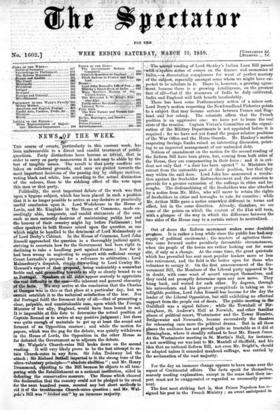Out of doors the Reform movement makes some doubtful progiress.
. It is rather a long while since the public has had:any supply of political excitement ; the masters of agitation there- fore come forward under peculiarly favourable circumstances, when the people of the towns are rather looking out for some stir, if only as a change. At the same time, the great quietude which has prevailed has sent most popular leaders more or less into retirement, and the field is the better open for those who volunteer to occupy it. On the first announcement of the Go- vernment Bill, the Members of the Liberal party appeared to be in doubt, with some want of accord amongst themselves, and they could not promptly determine upon any new move. They hung back, and waited for each other. By degrees, through his antecedents and his greater promptitude in taking an in- telligible position, Lord John Russell has become for the day the leader of the Liberal Opposition, but still exhibiting no effectual support from the people out of doors. The public meeting in the Guildhall was a signal failure ; while the Townhall of Bir- mingham, St. Andrew's Hall at Norwich, and other familiar places of political resort, Westminster and the Tower Hamlets, Bridgewater and Newcastle, became successively the theatres for rehearsing once more the political drama. But in all these places the audience has not proved quite so tractable as it did at Birmingham, where it steadily refused to hear Mr. Ernest Jones. At the Westminster meeting in St. Martin's Hall, for instance, a not unwilling ear was lent to Mr. Maiden of Sheffield, and his idea that no national Reform Bill, not even Mr. Bright's, should be adopted unless it conceded manhood suffrage, was carried by the acclamation of the vast majority.


























